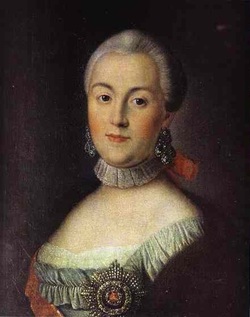 by Yoon Joung Lee The Russian empress, Catherine the Great, was born in 1729 in the German city of Szczecin. Her father was Prince Christian August of Anhalt-Zerbst, and her mother was Princess Johanna Elizabeth of Holstein-Gottorp. Although she recieved royal childhood treatment due to her family background, she didn’t receive a great deal of affection from her parents since her parents were hoping for a son. Even though Catherine was not close to her parents, she had a great governess, Babette, who Catherine had a close relationship during her childhood. Babette taught her several subjects including religion, history, French, German and music. When she became 15, she went to Russia by the invitation of Empress Elizabeth who knows Catherine’s family well. There, she met the heir to the throne, the Grand Duke Peter. She was married to the Grand Duke Peter when she was 16 in 1745 at Saint Petersburg, and converted her religion to Eastern Orthodoxy. Even though her father strongly opposed her conversion, she was accepted as a member at the Russian Orthodox Church. After marriage, the couple settled in the palace of Oranienbaum, and Catherine made various friends there. The friends shared private information about monarch’s intimate affairs, and one of them was about her husband, Peter. There was no affection or love between Catherine and Peter. They eventually became unfaithful to each other. Despite her loveless marriage, she was intelligent and ambitious in politics. She looked forward to the time she would rule Russia. She had shown her dedication to Russia and the Russian Orthodox faith. Her loyalty and ambition about politics earned her a powerful place on the throne as well as support of the Russian people. In 1762, Peter was proclaimed Emperor Peter III and Catherine became empress. However, during his six month of reign, he had made many enemies everywhere including the government, the military, and the church. Many plots overthrew him from the throne and his 7 year-old son Paul was placed on the throne instead. However, Catherine, as a temporary ruler, earned the actual ruling power until their young son became old enough to rule on his own. As a temporary ruler, her ambition aimed for a more powerful role for herself. She had also arrested Peter and made him to step down from power. In 1762, a few days after the arrest, he got killed by Alexei Orlove at Ropsha, a younger brother of Gregory Orlov who was Catherine's paramour. During her reign, she expanded the borders of the Russian Empire to the Black Sea, a key waterway in Europe and into central Europe. She extended total about 200,000 miles to Russian territory. She was ambitious about both domestic and foreign affairs. She selected great leaders to support her policy. Her foreign minister, Nikita Panin, was well selected to carry out such her policy. She promoted westernization and modernization to rule over Russia, and also promoted education and the Enlightment. Under her ruling, the country’s education system was expanded and the capital of Russia, St. Petersburg became one of the world’s most dazzling capitals. By the time when she needed to consider the her heir, her son Paul showed mentally instablility and she wasn’t sure about his ability to rule the country. She ruled Paul’s oldest son, Alexander, to be next emperor. Although she died before she corrected her arrangement, Alexander, whom Catherine greatly favored, eventurally became the emperor Alexander I in 1801. Catherine the Great died in 1796 by stroke. Her legacy is controversial, but there is no doubt that Catherine was one of the most influential female political figures in the world’s history. Comments are closed.
|
Archives
July 2017
Categories
All
|
 RSS Feed
RSS Feed